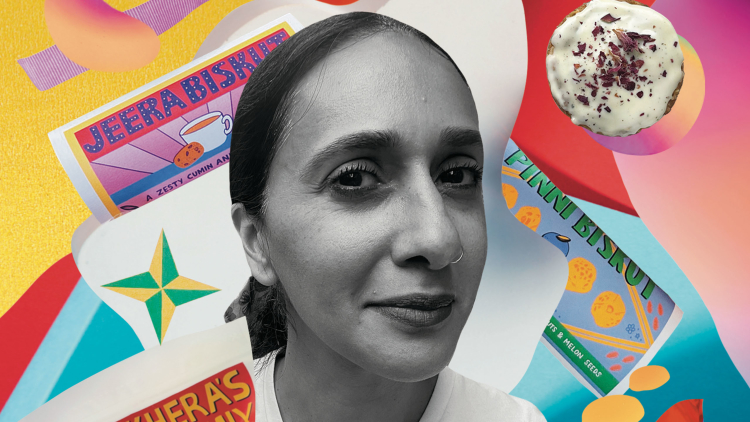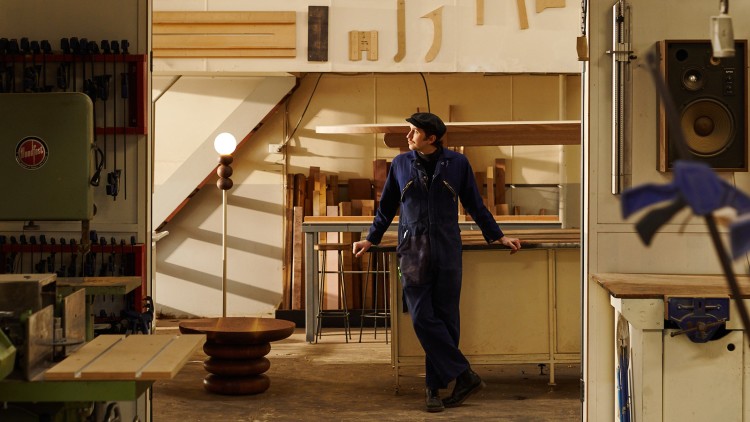
Chandani Kaur Kohli grew up surrounded by her family's Indian cooking. Originally from the US state of Virginia, Chandani had worked in fashion for most of her life before pivoting her career and founding her own specialty Indian biscuit brand, Biskut Bar. The brand is a mix of all of her interests, from fashion to her Punjabi heritage. Each pack of biscuits that she sells across the UK and US comes packaged in eye-catching paper wrappers or in signature afternoon-tea tins.
‘Indian cuisine, in general, isn't as integrated into the American mainstream,’ Chandani explains. She lived in New York for seven years, where she worked in fashion product management, before moving to the UK. ‘There's no tea-and-biscuit ritual in America in the same way [as in the UK]. Biscuits are a mainstream daily ritual here, and that's obviously a big part of the influence on Biskut Bar.’
Chandani's offering is carefully designed. Each biscuit is a unique take on a classic Indian sweet or flavor. ‘You're not going to get gulab jamun, you're not going to get rasgulla or the other sweets [Indians grow] up with. You'll get a contemporary version of those flavor profiles – but in biscuit form,’ she says. ‘In America, there are still cookies, and to do it in this way is novel. It's been really, really fun and interesting,’ she says.
The rewards of cooking
When she moved to the UK, Chandani found herself cooking more and more. ‘Here, everybody knows how to bake. Everybody knows how to make themselves a dish. It's an important life skill,’ she says. ‘If you look at America, there are a lot of quick fixes. When you're in places like New York, where [the ethos is] work hard, play hard, you don't go home and cook.’
She continues, ‘I cooked to center myself and I was also new to a country, so I didn't have many friends and I was figuring things out. When I started to realize that every dish broken down and deconstructed came from an ingredient that can also be made at home, I became curious.’ For now, Chandani is a one-woman team and creates all of Biskut Bar's products in her own kitchen.
A way to connect
The business was just an idea when the pandemic hit, but the time spent away from work helped her to make the decision to leave the fashion industry. ‘I already had all the ideas. What pushed me forward was [the thought]: if not now, when? If it's [going to be] done, why not me? Why can't I be part of it? If you want to be a part of the conversation, then you have to do the work,’ she says.
Giving her kids a way to connect with their heritage was also a key motivator. ‘If I'm this removed from my roots and culture, my kids are going to be that much more. I can give them the flavors and the foods I grew up with. I love the story of food so much and thinking about my heritage.’
Biskut Bar, and food more widely, has also been the way that Chandani taps into her own identity. ‘If someone were to have said, “You're gonna start something to do with Indian food or Indian sweets”, I would have thought, “No way” – I grew up in the west; all my friends were western, I was an all-American girl. But I never really was,’ she says. ‘It's telling of how fundamental food and those memories are that, all these years later, that's what I decided to build my career in. This is a small business right now, but I'm not looking for it to be small forever. I want it to be something that everyone can experience in this unique and modern but also authentic way.’
This article was first published in 100 Ways to Make a Living 2022. To purchase a copy or become a subscriber, head to our webshop.



